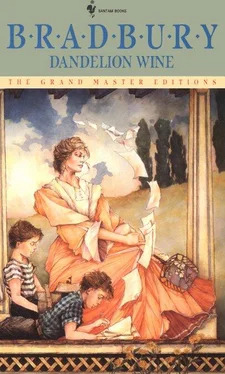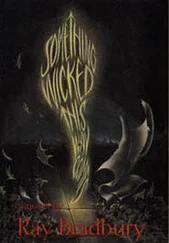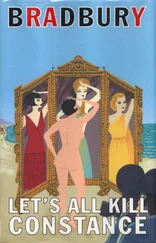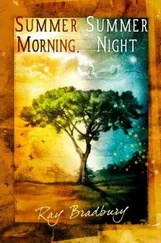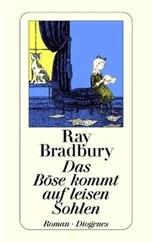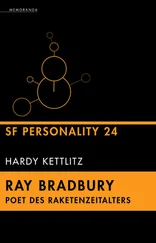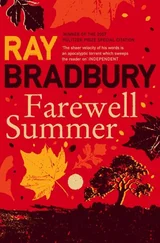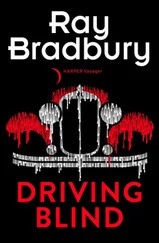“Fifteen.”
“Fifteen years of people stomping across it; I see every shoe print,” gasped Tom.
“Land, boy, you got a tongue,” said Great-grandma.
“I see all the things happened in that house in all those years right here!” Bang! “All the past, sure, but I can see the future, too. Just squinch up my eyes and peek around at the patterns, there, to see where we’ll be walking, running around, tomorrow.”
Douglas stopped swinging the beater. “What else you see in the rug?”
“Threads mostly,” said Great-grandma. “Not much left but the underskin. See how the manufacturer wove the thing.”
“Right!” said Tom mysteriously. “Threads one way, threads another. I see it all. Dire fiends. Deadly sinners. There’s bad weather, there’s good. Picnics. Banquets. Strawberry festivals.” He tapped the beater from place to place portentously.
“That’s some boardinghouse you got me running,” said Grandma, glowing with exertion.
“It’s all there, fuzzylike. Hold your head on one side, Doug, get one eye almost shut. It’s better at night, of course, inside, the rug on the floor, lamplight and all. Then you get shadows all shapes, light and dark, and watch the threads running off, feel the nap, run your hand around on the fur. Smells just like a desert, I bet. All hot and sandy, like inside a mummy case, maybe. Look, that red spot, that’s the Happiness Machine burning up!”
“Catsup from somebody’s sandwich, no doubt,” said Mom.
“No, Happiness Machine,” said Douglas, and was sad to see it burning there. He had been counting on Leo Auffmann to keep things in order, keep everybody smiling, keep the small gyroscope he often felt inside himself tilting toward the sun every time the earth tilted toward outer space and darkness. But no, there was Auffmann’s folly, ashes and cinders. Bang! Bang! Douglas struck.
“Look, there’s the green electric runabout! Miss Fern! Miss Roberta!” said Tom. “Honk, Honk!” Bang!
They all laughed.
“There’s your life-strings, Doug, running along in knots. Too many sour apples. Pickles at bedtime!”
“Which one, where?” cried Douglas, peering.
“This one, one year from now, this one, two years from now, and this one, three, four, five years from now!”
Bang! The wire beater hissed like a snake in the blind sky.
“And one to grow on!” said Tom.
He hit the rug so hard all the dust of five thousand centuries jumped from the shocked texture, paused on the air a terrible moment, and even as Douglas stood, eyes squinted to see the warp, the woof, the shivering pattern, the Armenian avalanche of dust roared soundless upon, over, down and around, burying him forever before their eyes . . .
How it began with the children, old Mrs. Bentley never knew. She often saw them, like moths and monkeys, at the grocer’s, among the cabbages and hung bananas, and she smiled at them and they smiled back. Mrs. Bentley watched them making footprints in winter snow, filling their lungs with autumn smoke, shaking down blizzards of spring apple-blossoms, but felt no fear of them. As for herself, her house was in extreme good order, everything set to its station, the floors briskly swept, the foods neatly tinned, the hatpins thrust through cushions, and the drawers of her bedroom bureaus crisply filled with the paraphernalia of years.
Mrs. Bentley was a saver. She saved tickets, old theater programs, bits of lace, scarves, rail transfers; all the tags and tokens of existence.
“I’ve a stack of records,” she often said. “Here’s Caruso. That was in 1916, in New York; I was sixty and John was still alive. Here’s Tune Moon, 1924, I think, right after John died.”
That was the huge regret of her life, in a way. The one thing she had most enjoyed touching and listening to and looking at she hadn’t saved. John was far out in the meadow country, dated and boxed and hidden under grasses, and nothing remained of him but his high silk hat and his cane and his good suit in the closet. So much of the rest of him had been devoured by moths.
But what she could keep she had kept. Her pink-flowered dresses crushed among moth balls in vast black trunks, and cut-glass dishes from her childhood—she had brought them all when she moved to this town five years ago. Her husband had owned rental property in a number of towns, and, like a yellow ivory chess piece, she had moved and sold one after another, until now she was here in a strange town, left with only the trunks and furniture, dark and ugly, crouched about her like the creatures of a primordial zoo.
The thing about the children happened in the middle of summer. Mrs. Bentley, coming out to water the ivy upon her front porch, saw two cool-colored sprawling girls and a small boy lying on her lawn, enjoying the immense prickling of the grass.
At the very moment Mrs. Bentley was smiling down upon them with her yellow mask face, around a corner like an elfin band came an ice-cream wagon. It jingled out icy melodies, as crisp and rimmed as crystal wineglasses tapped by an expert, summoning all. The children sat up, turning their heads, like sunflowers after the sun.
Mrs. Bentley called, “Would you like some? Here!” The ice-cream wagon stopped and she exchanged money for pieces of the original Ice Age. The children thanked her with snow in their mouths, their eyes darting from her buttoned-up shoes to her white hair.
“Don’t you want a bite?” said the boy.
“No, child. I’m old enough and cold enough; the hottest day won’t thaw me,” laughed Mrs. Bentley.
They carried the miniature glaciers up and sat, three in a row, on the shady porch glider.
“I’m Alice, she’s Jane, and that’s Tom Spaulding.”
“How nice. And I’m Mrs. Bentley. They called me Helen.”
They stared at her.
“Don’t you believe they called me Helen?” said the old lady.
“I didn’t know old ladies had first names,” said Tom, blinking.
Mrs. Bentley laughed dryly.
“You never hear them used, he means,” said Jane.
“My dear, when you are as old as I, they won’t call you Jane, either. Old age is dreadfully formal. It’s always ‘Mrs. ’ Young People don’t like to call you ‘Helen. ’ It seems much too flip.” “How old are you?” asked Alice.
“I remember the pterodactyl.” Mrs. Bentley smiled.
“No, but how old?”
“Seventy-two.”
They gave their cold sweets an extra long suck, deliberating.
“That’s old,” said Tom.
“I don’t feel any different now than when I was your age,” said the old lady.
“Our age?”
“Yes. Once I was a pretty little girl just like you, Jane, and you, Alice.”
They did not speak. “What’s the matter?”
“Nothing.” Jane got up.
“Oh, you don’t have to go so soon, I hope. You haven’t finished eating . . . Is something the matter?”
“My mother says it isn’t nice to fib,” said Jane.
“Of course it isn’t. It’s very bad,” agreed Mrs. Bentley.
“And not to listen to fibs.”
“Who was fibbing to you, Jane?”
Jane looked at her and then glanced nervously away. “You were.”
“I?” Mrs. Bentley laughed and put her withered claw to her small bosom. “About what?” “About your age. About being a little girl.”
Mrs. Bentley stiffened. “But I was, many years ago, a little girl just like you.”
“Come on, Alice, Tom.”
“Just a moment,” said Mrs. Bentley. “Don’t you believe me?”
“I don’t know,” said Jane. “No.”
“But how ridiculous! It’s perfectly obvious. Everyone was young once!”
“Not you,” whispered Jane, eyes down, almost to herself. Her empty ice stick had fallen in a vanilla puddle on the porch floor.
Читать дальше
